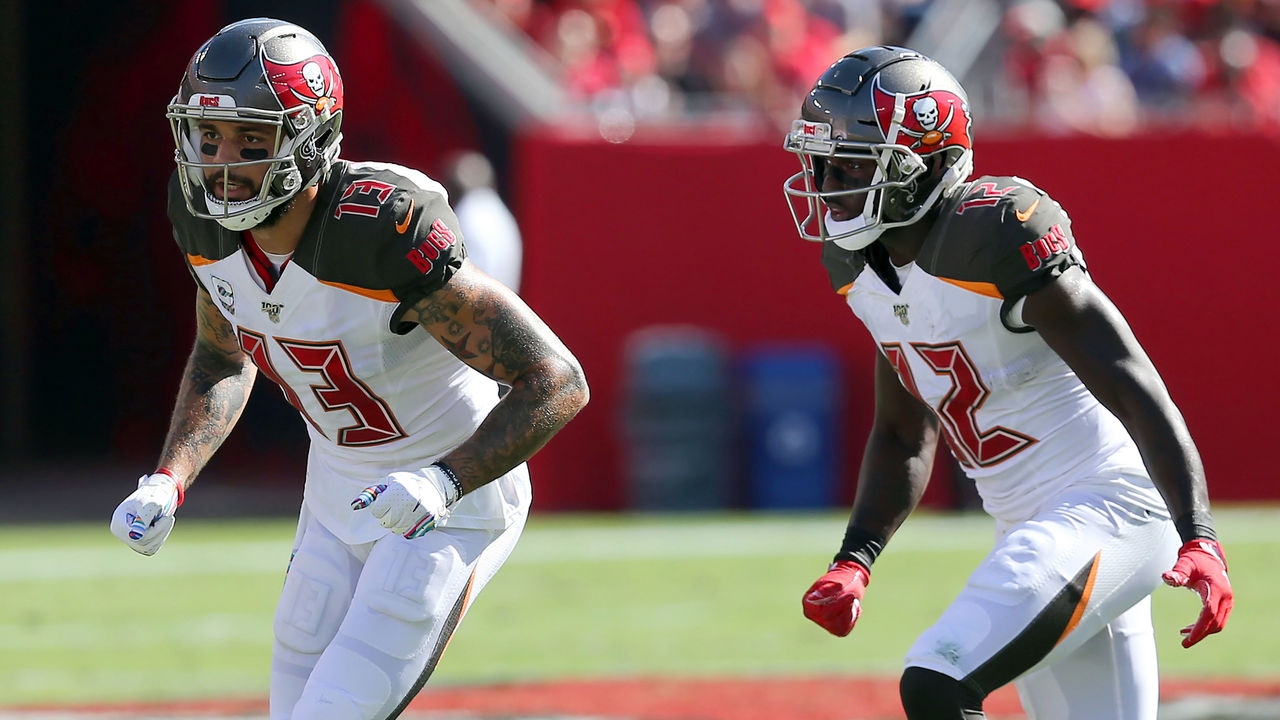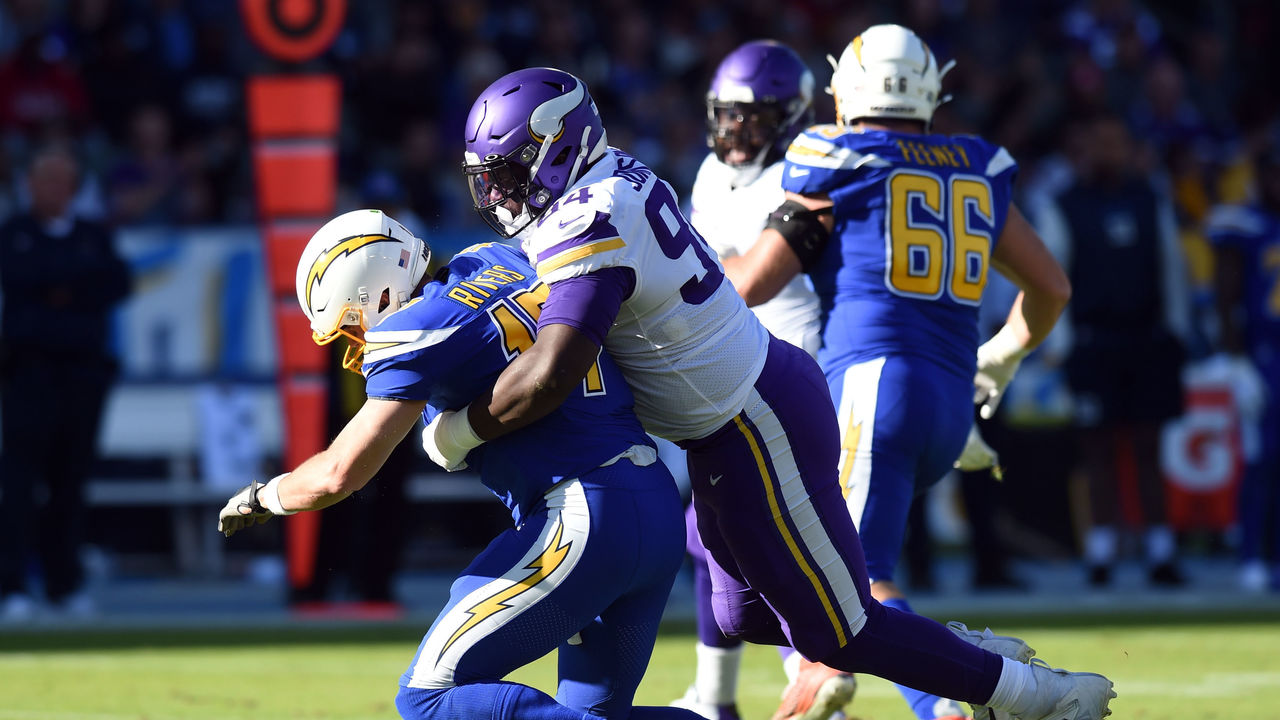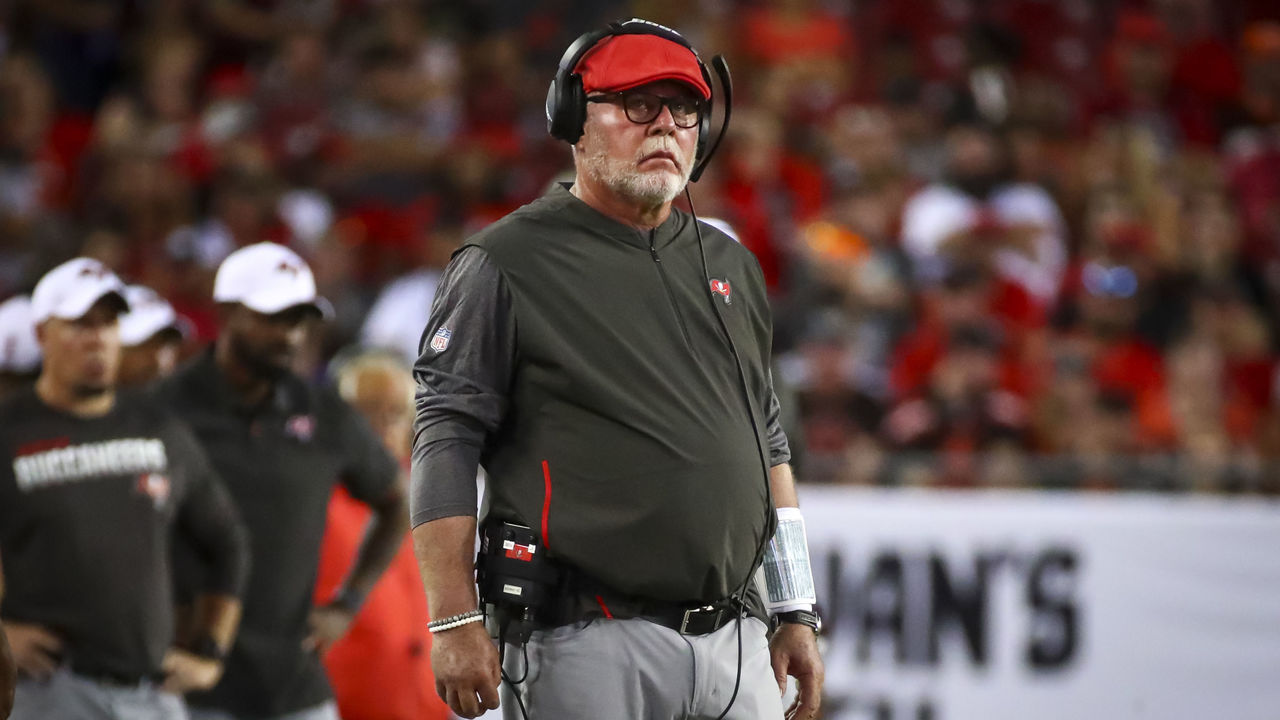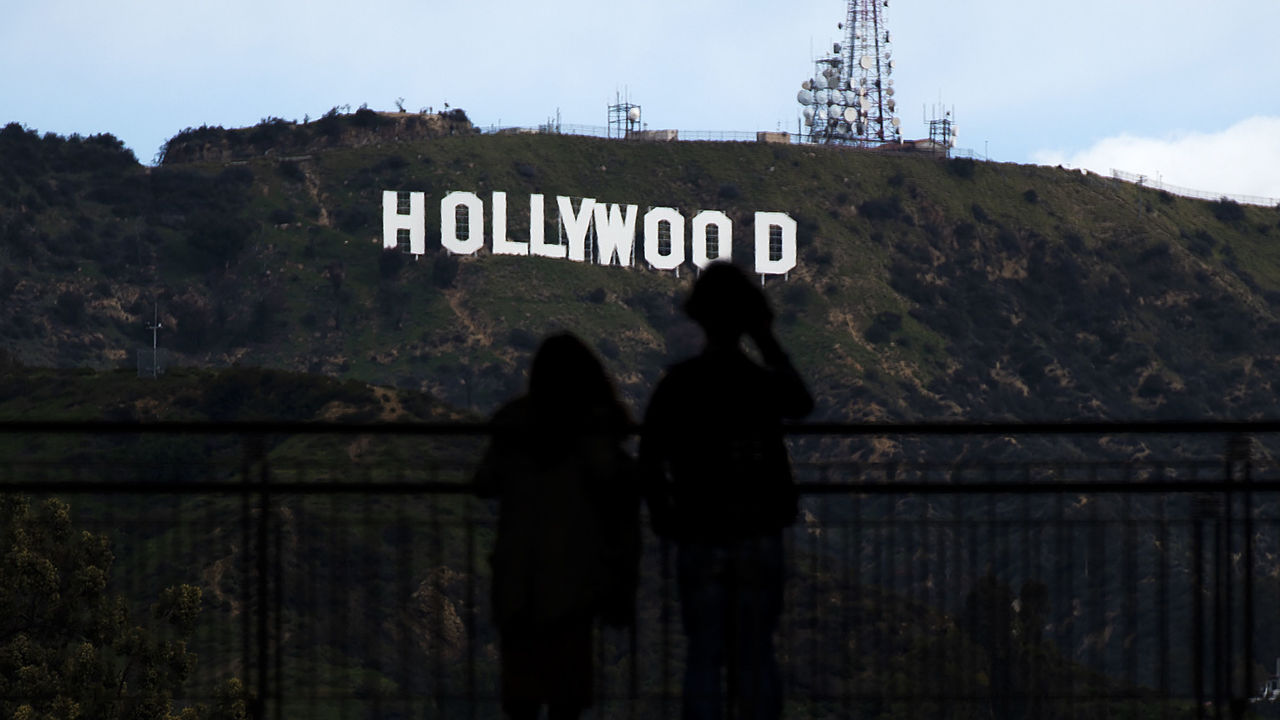Bucs vs. Chargers: Which team is the best fit for Tom Brady?
Just like Peyton Manning, Brett Favre, and Joe Montana before him, Tom Brady won't finish his Hall of Fame career with the team that drafted him.
On Tuesday, Brady announced that he won't return to the New England Patriots for 2020. His next home is still a mystery, but the Tampa Bay Buccaneers and Los Angeles Chargers are being heavily linked to the star quarterback. Both franchises have reportedly offered Brady at least $30 million per year in free agency.
Other teams could still jump into the race, but for now, let's break down the Bucs and Chargers to determine which side would give Brady the best chance at adding a record seventh Super Bowl title to his resume.
Receivers and tight ends

Buccaneers: WRs Mike Evans, Chris Godwin; TEs O.J. Howard, Cameron Brate
Chargers: WRs Keenan Allen, Mike Williams; TE Hunter Henry
Both the Buccaneers and Chargers would provide Brady with a talented cast of pass-catchers, but it's easy to see why the former's group would be more enticing.
If Brady lands in Tampa, Evans would easily be the best receiver he's played with since Randy Moss (if we don't count the one game with Antonio Brown). In fact, Evans and Moss are the only players in NFL history to start their careers with six straight 1,000-yard seasons.
And, the Bucs arguably have another player who's worthy of being considered a true No. 1 wideout. Godwin actually outproduced Evans during 2019 (while playing one more game), finishing third in the league in receiving yards (1,333) and tied for fourth in receiving touchdowns (nine).
Evans and Godwin dominate downfield in head coach Bruce Arians' ultra-aggressive offense, as they ranked sixth and 14th, respectively, in yards per catch last year. There is one caveat, though: Given that Brady's arm isn't what it once was, the "no risk it, no biscuit" scheme might not be the best fit at this stage of his career.
Arians usually forgets about his tight ends, while Brady's been at his best when playing with elite options at the position. Tampa Bay does possess two reliable TEs in Howard and Brate, and the former could have serious untapped potential. With all of these weapons, Brady and Arians would have the freedom to reshape the offense into whatever works best from week to week.
Meanwhile, in L.A., Allen would immediately replace Julian Edelman as Brady's BFF. One of the NFL's most savvy route-runners, Allen is a master at getting open from the slot and exposing zone defenses. He already has two 100-catch seasons under his belt, and he would almost certainly add to that total with Brady.
Williams produced the first 1,000-yard season of his career in 2019 while leading the league in yards per catch (20.4). The former first-rounder excels at winning 50-50 balls and creating big plays. While he found the end zone just twice in 2019, he produced 10 scores the year before.
Brady would have another big target over the middle of the field in Henry, who's one of the most complete tight ends in the game when healthy. The Chargers recently used their franchise tag to retain the former second-rounder, so Henry will be around for at least 2020.
Advantage: Bucs
Running backs
Buccaneers: RBs Ronald Jones, Peyton Barber
Chargers: RBs Austin Ekeler, Justin Jackson
Brady has consistently played with above-average running attacks, but he likely won't in 2020 if he joins the Bucs or Chargers. Tampa Bay ranked 24th in rushing yards and 17th in rushing touchdowns in 2019, while L.A. ranked 28th and 21st, respectively.
Melvin Gordon, the Chargers' top running back since 2015, is likely heading for a new team this offseason, which means adding to the backfield should be a top priority.
Ekeler was re-signed over Gordon, and while he was only average when running the ball last year (557 rushing yards, 4.2 yards per carry), he was a monster pass-catcher out of the backfield. Ekeler caught 92 balls in 2019 (second only to Christian McCaffrey) for 993 yards and eight touchdowns. Brady is known for his love of pass-catching backs, and in Ekeler, he'd have a more explosive version of James White.
Like L.A., Tampa Bay has some questions at running back.
Barber is a journeyman who averaged just over 3 yards per carry last season and likely needs to be pushed down the depth chart by a new signing. Jones, a 2018 second-rounder, bounced back from an awful rookie season to rack up 724 yards and six touchdowns in 2019.
Despite his improvement, Jones is inexperienced, has fumbling issues, and needs to get better in pass protection. That's not a recipe for staying in Brady's good books.
In short, neither team can't expect Brady to be satisfied with its current backfield situation.
Advantage: Chargers
Offensive line

Buccaneers: LT Donovan Smith, LG Ali Marpet, C Ryan Jensen, RG Alex Cappa, RT Josh Wells
Chargers: LT Trent Scott, LG Dan Feeney, C Mike Pouncey, RG Trai Turner, RT Bryan Bulaga
While their running backs aren't anything special, the Bucs have the Chargers beat when it comes to offensive lines.
Jensen and Marpet are standout interior pass-protectors who should allow Brady to move up in the pocket at will, while Smith is a solid blind-side guardian. The Bucs might need a new right tackle, as Demar Dotson is a free agent.
Quarterback Jameis Winston was sacked 47 times last year (fifth most in the league), but many of those were due to him holding the ball too long.
In comparison, Rivers was sacked just 34 times (18th most) while working without longtime left tackle Russell Okung for much of the year. However, Rivers has elite-level pocket presence, so he made L.A.'s line look better than it actually was.
Moreover, the Chargers have reportedly agreed to trade Okung to the Carolina Panthers for guard Trai Turner. Turner is a Pro Bowler who will certainly upgrade L.A.'s interior O-line, but losing Okung means the overall unit isn't much better for the time being.
We saw how much a struggling offensive line hurt Brady last year, so Tampa Bay's more settled group could tip the scales in its favor.
Advantage: Bucs
Defense
At this stage of his career, Brady isn't winning a Super Bowl without significant help from the other side of the ball.
If healthy, the Chargers can field a top-five defense in 2020. They ranked eighth in scoring defense in 2018 before dropping to 14th last year amid a rash of injuries, most notably to Derwin James. The safety was key to the Chargers' success in 2018 when he earned first-team All-Pro honors as a rookie.
If James returns to form and stays on the field, L.A. will feature a lot of difference-makers on defense. Joey Bosa and Melvin Ingram form one of the league's best pass-rushing duos, while cornerback Casey Hayward is an underrated stud.
L.A.'s main issue might be a lack of depth, especially at linebacker and cornerback. Hayward needs a better running mate.
Meanwhile, the Bucs have been working hard to keep their defense intact this offseason, though that decision is questionable after the unit ranked 29th in scoring defense and 15th in total defense last year.
Shaq Barrett, who broke out in 2019 while leading the league in sacks, was hit with the franchise tag, while fellow pass-rusher Jason Pierre-Paul was re-signed on a two-year deal. Ndamukong Suh and Carl Nassib will need to be replaced.
In Lavonte David and Devin White, Tampa Bay has a pair of do-it-all linebackers who can cover downfield, rack up tackles, and even rush the passer. That duo was a big reason why the team led the league in run defense last year.
The young secondary is where Tampa Bay has significant holes, as the Bucs allowed the third-most yards through the air last season.
Cornerback Carlton Davis was the unit's best player after taking on a bigger role following the midseason release of Vernon Hargreaves. The Bucs should try to upgrade from fellow corner Sean Murphy-Bunting and safeties Andrew Adams and Mike Edwards, as Brady can't exactly wait for them to develop.
Both the Chargers' and Bucs' defenses will be a step down from the units that supported Brady during his last year with the Patriots, but the AFC West team has fewer weaknesses and features more elite players.
Advantage: Chargers
Coaching and front office

Buccaneers: HC Bruce Arians, OC Byron Leftwich, DC Todd Bowles, GM Jason Licht
Chargers: HC Anthony Lynn, OC Shane Steichen, DC Gus Bradley, GM Tom Telesco
You can only go one way when leaving Belichick. But Arians, a two-time Coach of the Year, is among the best in the business.
During Arians' career, he's worked with big-name quarterbacks like Peyton Manning, Ben Roethlisberger, and Andrew Luck. He knows how to manage a team with a star under center, so even the GOAT shouldn't intimidate him.
Arians does, however, come with a significant drawback. The 67-year-old has already retired twice, most recently stepping away in 2017 due to serious health concerns. If Brady truly wants to play until he's 45, can he rely on Arians being in Tampa the entire time?
Additionally, Tampa Bay's front office has been inconsistent - to say the least - since Licht took over as GM in 2014. Free-agent busts like Darrelle Revis and draft misses like Hargreaves would've caused most GMs to lose their job, but Arians pushed to keep Licht when he came aboard.
The NFC South team is reportedly willing to give Brady a say in personnel moves, but it would be fair for him to question whether the front office is capable of putting the best roster around him over the next few years.
In comparison to Arians, Lynn lacks experience. He's only been a head coach for three seasons, producing a 26-22 record and just one playoff appearance. The 51-year-old has worked with another big personality in quarterback Philip Rivers, and he does come from an offensive background - both of which should be positive factors for Brady.
Stylistically, Lynn runs a dink-and-dunk-type offense that's far more similar to what Brady has been part of in New England. Additionally, the Chargers coach would likely be more open to changing his scheme to make his new QB happy.
L.A.'s front office frequently nails its first-round picks - see: James (2018), Williams (2017), Bosa (2016), and Gordon (2015) - but the team has arguably been held back by a roster that's too top-heavy and exposed by injuries due to cap mismanagement.
Brady will want his new team to splash the cash and go all-in. Fortunately, both Tampa Bay ($60.08 million, third-most cap space) and L.A. ($44.05 million, 10th-most cap space) have the resources to make big moves, per Over The Cap.
Advantage: Bucs
Competition
Brady will play for a new team in 2020. But does he want to suit up in a new conference?
The quarterback has spent his entire 20-year career in the AFC, and it's been his domain for much of that time. Nobody knows the ins and outs of the conference better than Brady does - other than maybe the head coach he's leaving behind. With the Chargers, Brady wouldn't require much time to get up to speed on his more frequent opponents. And at 42 years old, he doesn't have the luxury of wasting any years.
That said, choosing L.A. would put Brady in a division with the NFL's next potential dynasty and its best quarterback. Spending the next two or three seasons in a war with Patrick Mahomes and Andy Reid for the AFC West crown (and perhaps as early as 2021, the lone AFC playoff bye due to the new CBA) could severely hurt Brady's chance of adding a seventh Lombardi Trophy.
On the other hand, the Bucs' division is far from a cakewalk. Drew Brees is coming back for at least another season in New Orleans, the Atlanta Falcons have a top-10 quarterback and were in the Super Bowl three seasons ago, and while the Carolina Panthers are seemingly rebuilding, they should be one of the stronger No. 4 teams even after swapping out Cam Newton for Teddy Bridgewater.
Overall, the NFC is arguably more stacked with possible contenders. In addition to the Saints, the Green Bay Packers, San Francisco 49ers, Seattle Seahawks, Minnesota Vikings, Philadelphia Eagles, Los Angeles Rams, and Dallas Cowboys will all enter the 2020 season with the expectation of competing for a title.
Brady is known as one of the game's fiercest competitors, and if his decision comes down to the Bucs or Chargers, both landing spots will require him to overcome significant obstacles if he wants to continue his success.
Advantage: Tie
Off-field benefits

It's easy to see the bright lights of L.A. being far more appealing to Brady.
The quarterback recently announced he's starting his own content company that will produce original films, TV shows, and documentaries. Living in the heart of the entertainment industry would naturally help expand that enterprise and assist any other media-related plans that Brady has for his post-football career.
Brady would also be the face of L.A. football during the team's first season in its new $5-billion stadium. Even in a city that's home to LeBron James and Kawhi Leonard, Brady would get more attention than in Tampa Bay.
That said, Florida isn't without its benefits. No income tax is likely at the top of that list, as is staying on the East Coast and playing in warm weather.
Ultimately, what motivates Brady in his personal life is anyone's guess, as the quarterback likes to keep his cards close to his chest.
Advantage: Chargers